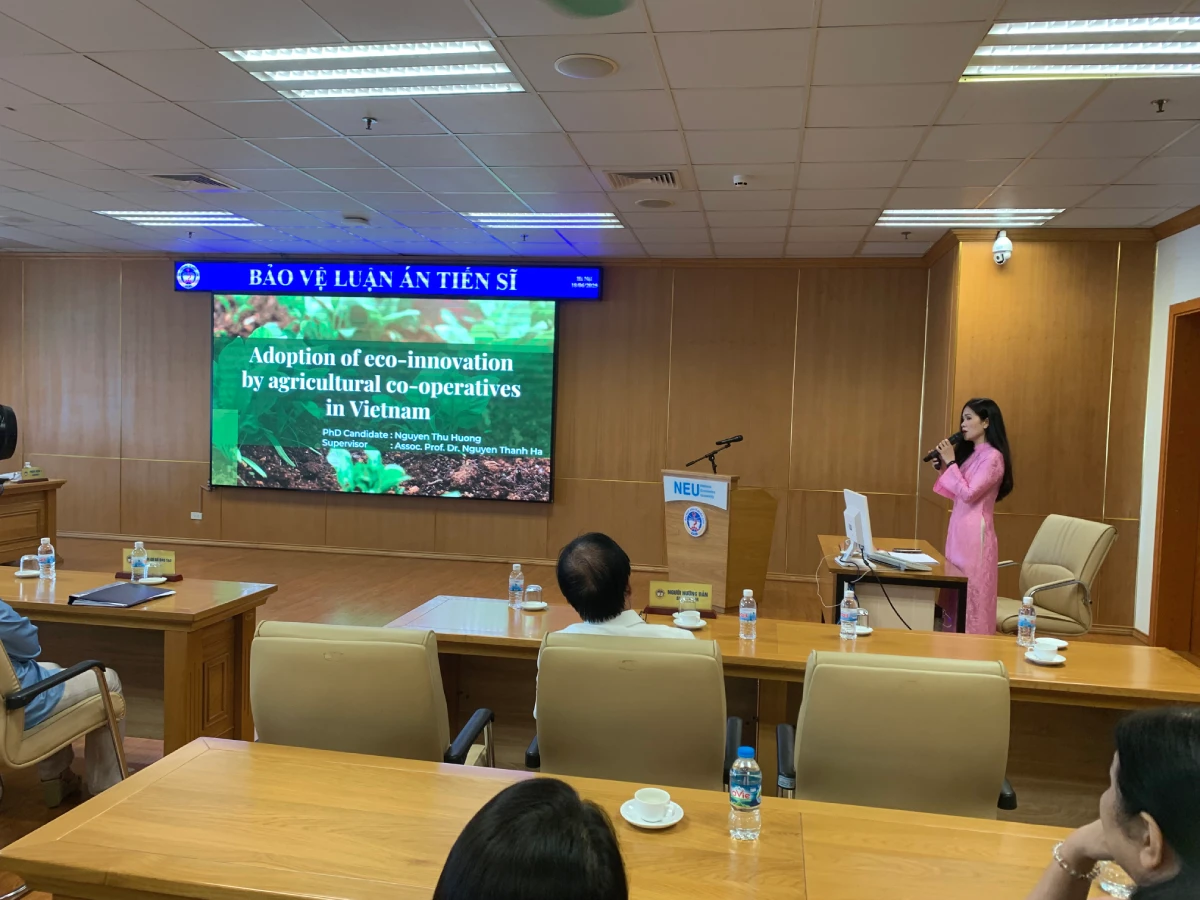On the afternoon of June 20, 2025, at Room P501, Building A2, National Economics University held the doctoral dissertation defense ceremony for PhD candidate Nguyen Thu Huong, majoring in Economics (English program), with the research topic "Adoption of eco-innovation by agricultural co-operatives in Vietnam".
The doctoral dissertation was supervised by Associate Professor Dr. Nguyen Thanh Ha from National Economics University.
The ceremony was attended by council members, including representatives from National Economics University: Associate Professor Dr. Ho Dinh Bao – Council Chairman, Associate Professor Dr. Le Thanh Ha, and Associate Professor Dr. Bach Ngoc Thang; external members included: Associate Professor Dr. Tu Thuy Anh from Foreign Trade University, Dr. Dang Duc Anh from Central Institute for Economic Management, and Associate Professor Dr. Nguyen Mau Dung from Vietnam National University of Agriculture.

Additionally, the ceremony was attended by the supervising faculty member, colleagues from the candidate's workplace, friends, and family members of the PhD candidate.
Under the chairmanship of Associate Professor Dr. Ho Dinh Bao – Council Chairman, the Council reviewed the academic background, research achievements, learning process, and scientific research results of PhD candidate Nguyen Thu Huong throughout her dissertation project implementation. The Council members highly praised the candidate's academic achievements, research outcomes, and dedicated efforts during this period.
Subsequently, PhD candidate Nguyen Thu Huong presented her research findings to the Council.
In her doctoral dissertation, PhD candidate Nguyen Thu Huong conducted research on "Adoption of eco-innovation by agricultural co-operatives in Vietnam". This dissertation makes four important theoretical contributions to the existing literature.
First, despite growing interest in eco-innovation, there remains a lack of empirical research applying a comprehensive theoretical framework that integrates its various drivers, such as external context and firm-level characteristics. To address this gap, the research applies the Motivation-Opportunity-Ability (MOA) framework to examine how factors related to motivation, opportunity, and ability influence eco-innovation adoption across three types of agricultural cooperatives: technology-driven, market-driven, and authority-driven. Through this approach, the study contributes to eco-innovation literature by establishing theoretical connections between external contextual factors and internal organizational capabilities, providing comprehensive insights into conditions that support successful eco-innovation adoption. Second, this dissertation contributes to eco-innovation literature as very few studies investigate how agricultural cooperatives implement eco-innovation. Specifically, the dissertation explores how fundamental motivations behind agricultural cooperative formation influence their eco-innovation adoption approaches. The research identifies three distinct eco-innovation adoption modes, each corresponding to a specific cooperative type: technology-driven, market-driven, and authority-driven. By examining these modes, the study outlines implementation steps, highlights challenges faced, and identifies necessary support mechanisms for successful eco-innovation adoption in each cooperative type. Third, this research extends the Natural Resource-Based View (Hart, 1995) within the agricultural cooperative context. In this way, the study also contributes to eco-innovation literature due to the lack of consensus among scholars regarding the empirical impact of eco-innovation on organizational economic performance. Finally, previous studies primarily focused on external moderating variables, such as market turbulence and environmental instability, when examining the relationship between eco-innovation and firm performance. However, there remains a notable research gap regarding boundary conditions related to capability-based factors that may moderate this relationship, particularly in agricultural cooperative contexts. Therefore, this research contributes to theoretical development by suggesting conditional effects of capability-related factors, including financial capital, green human capital, and external social capital on the relationship between eco-innovation and economic performance, as the conditional effects of these factors have been overlooked in previous research.
The dissertation's key findings have been published in international scientific journals indexed in ISI/Scopus databases.
According to the Council members' evaluation, the dissertation reflects PhD candidate Nguyen Thu Huong's serious learning and research process. The research results demonstrate high scientific value and practical applicability.
Following the discussion, the dissertation examination Council conducted a closed meeting, resulting in unanimous approval from all 6 attending members. Associate Professor Dr. Ho Dinh Bao, on behalf of the Council, congratulated PhD candidate Nguyen Thu Huong on her successful doctoral dissertation defense.
Congratulations to Dr. Nguyen Thu Huong!
Article and photos: Institute for Sustainable Development
